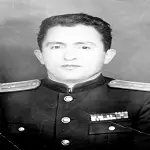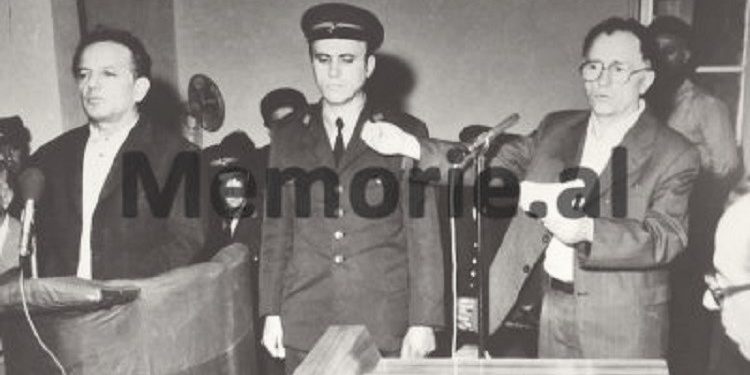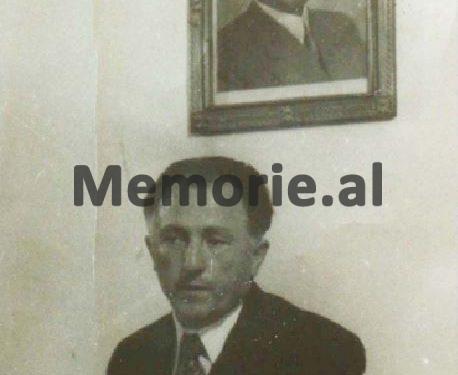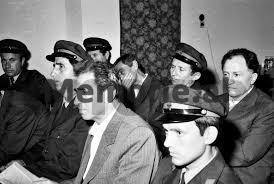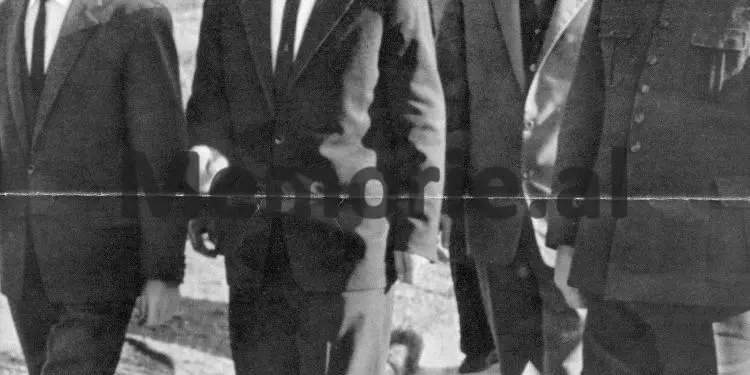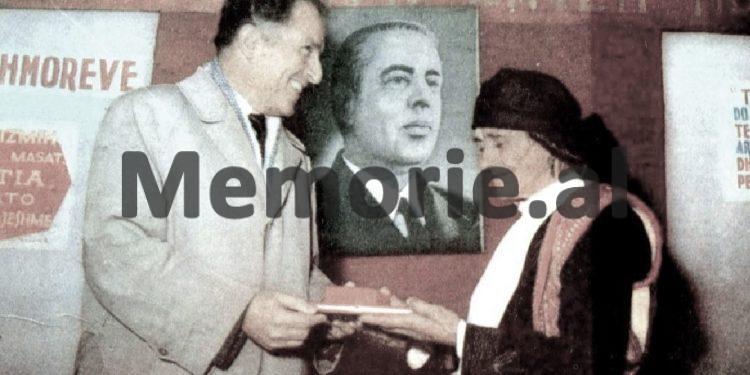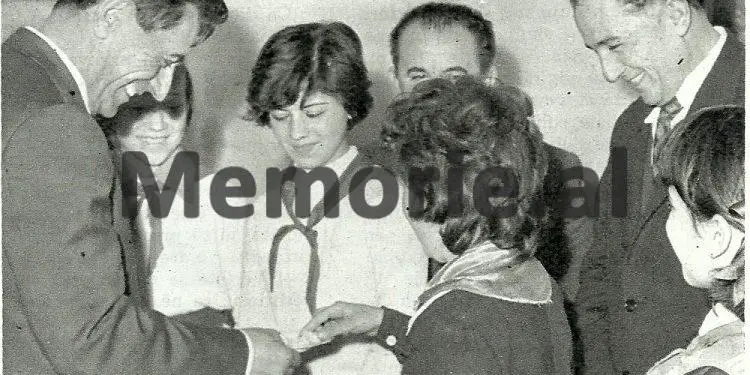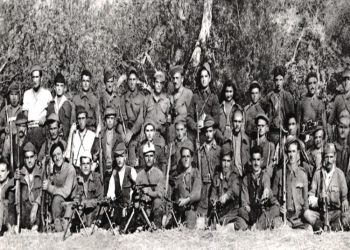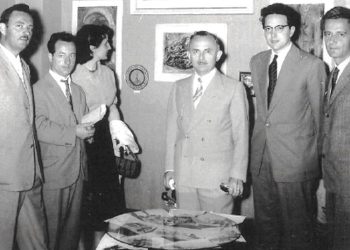By Manjola Bregasi
Memorie.al / Victim or executioner!? More than a mystery, it is a story that keeps hidden within itself the metamorphosis of the dictatorship system. There is a moment when the protagonist of the monster guillotine finally becomes its victim. After a successful career at the head of the organs of the dictatorship that led him to the head of the State Security Department, Feçor Shehu, he himself would become a victim of their fatal blow. Being described as part of the hostile group of Mehmet Shehu, the Minister of the Interior Feçor Shehu, on September 15, 1983, was shot together with the other accused, as members of the anti-party group of this group; Kadri Hazbiu, Llambi Peçini and Llambi Ziçishti.
Of course, as it happened in such cases, even more so when it came to such important people, the family, not only did not have the right to take the body and know the grave, but would be persecuted and tortured for the rest of their lives. Perhaps it may seem paradoxical that, like him, the all-powerful man, who had condemned and punished so many others, had come to an end and could not save himself or his family.
The wife and daughters of the former Minister of the Interior were sent to Gramsh, where they were left alone and without their former friends and relatives. Even the closest people, brothers and sisters could not be near them. Living under the pressure of the name “brother”, “sister”, “brother-in-law” or “sister-in-law” of Feçor, no one wanted to burden their positions and risk prison, so they agreed to distance themselves, leaving the two girls alone and the wife of Feçor Shehu. Now, when more than 20 years have passed since the shooting of his brother, Liri Shehu (Kodheli), as he remembers his brother, his eyes fill with tears and he feels somewhat guilty in front of his memory. “I believed that he was an enemy and at the enterprise meeting I spoke with hatred, believing that he had betrayed the Party.”
Ms. Liri, where were you, Feçor Shehu’s sister, at the time your brother was arrested and considered an enemy?
At that time I was a seamstress in the army. It had been a while since I had run away from the company where I had a normal job and where I had worked all my life, and with the help of my son-in-law, who was an officer, I switched to the maintenance of the Army, to escape from the norm.
Did you have privileges, since your brother was a minister?
I didn’t have any privileges. I’ve been a seamstress all my life and we never even spoke or used his name back then. Even in the palace and in the neighborhood, only after his sentence did they find out that I was Feçor’s sister.
Do you remember the day when Feçori was arrested and where did you learn the news?
As far as I remember, it was February 24, 1982. I heard the news when I came home from work. There I found the son-in-law and he told me that Feçor had been arrested and accused of being an enemy of the people.
What did you do in those moments?
At that moment I did nothing, but at dinner I took the little girl, who was 25 years old at the time, and we went to Feçor’s house.
Who did you find there?
Only the wife was there.
What did you talk to him about?
We didn’t talk much either, because we were afraid of any eavesdropping or any camera that might have been placed in the house. We asked her how work was and she only told us: “She went to work and didn’t come back.” He did not speak more and we did not ask him for clarification. From that moment on, I severed all ties with my sister-in-law and nieces. Three days later they exiled them to Gramsh and we did not see them until 1991, when they returned from there. After the murder of Feçor, we also severed ties with the family of Yzedini’s other brother, because we were afraid.
Have you been to court?
No, no, it was out of the question. We cut off all contact there, because every day things were getting worse. The time was such that it was enough that I was his sister and I was in danger, if I maintained relations with the family, I would have even more serious consequences, up to imprisonment.
Did you have any consequences?
We escaped well because my husband was a party member. Immediately after Feçor’s arrest, the man was called to the party organization and told: – Either keep the wife, or keep the party. I will keep the party, – he answered. After the meeting, the man came home and told me everything that had happened. I took courage and went to the Party Committee myself, where a woman, her name was Fize, met me. I don’t understand politics and I don’t even know my brother’s affairs, – I told him. I have tried to teach and educate my children with the teachings of the party and I do not want them to destroy my family. I’m going to look into this matter, – she told me.
I also met the secretary of the party, who told me: “Wait a minute, don’t take the separation documents to court.” Apparently, later this conversation stopped and he was no longer harassed. However, they removed me from the job I was in and brought me back to normal. The eldest son-in-law who was with the Sigurimi outside Albania was fired, the second daughter was left by her husband and lost her 8-month-old child, and everywhere we went, people looked at us with crooked eyes, like Feçor Shehu’s sister. Then all the time we lived with the fear of exile or with the fear that the husband could be expelled from the party. The investigation of Feçor Shehu has lasted more than a year.
Did you have information about what happened to him and his family during this period?
No information. At that time we cut off all contact. After 1991, his wife and daughters tell us about their life in exile and the time of the investigation, when Majnurja was also interrogated several times, but they also do not want to talk about this issue.
How did you hear the news that Feçori was sentenced to death?
I heard the news of the death sentence 5 days before he was shot. There at the company, when I was in the maintenance of the Army, a letter came announcing Feçor’s punishment and all the employees, 400 people, called us to a meeting about this work. There they informed us that the enemy of the people, Feçor Shehu, had been sentenced to death.
How did you receive the news, especially in front of the team?
I didn’t give myself away. I did not shed a tear. Not that I didn’t feel sorry for my brother, but I had to be strong, so that they wouldn’t call me an enemy either. Then to tell you the truth at that time I believed that he was really guilty. I often said to myself: “What was this Feçori Janam looking for, when he lived with all the good things and didn’t suffer like us”?!
Now what do you think, who was or was not guilty?
But from what they are saying and what we are reading, it appears that he was neither guilty nor an enemy, I don’t know more.
And later, after the shooting, did you cry for your brother?
I cried for him, but secretly. Even when I remembered it sometimes while walking down the street, I kept to myself and let out my sobs, only when a car passed by, so that I wouldn’t be heard. Even at home I couldn’t cry because I was afraid. We Malaykastrians have a habit of crying loudly for our relatives and loved ones, but I couldn’t cry for Feçor.
What was discussed at the company meeting?
At the company meeting, after they were told that Feçor Shehu had been sentenced to be shot, they asked me to speak and give my opinion.
Did you speak?
Yes, I spoke. Now I say to myself that I burdened my brother and took revenge on him, but I really thought that he was guilty, so there at the company meeting I said: “If he really committed a crime, he should be punished and I have no mercy for him. Even death is rare.”
Do you regret saying those words now?
I am sorry and my conscience is heavy, especially when we hear that they were tortured and mutilated in prisons.
Where did you hear this from?
From the TV. When the footage of the trial was shown at the beginning, I saw Feçor with a sign on his face. He had never had that mark before.
A lot has been said about the tortures that were done to Feçor Shehu and others who were arrested with him, but there is also a lot of talk about the tortures that Feçor Shehu himself did when he was in office. It is said that many people were killed and persecuted only by Feçor Shehu, do you know anything about this?
I don’t know anything about this and I never believed that my brother was a criminal. At least at that time there was no way to find out about these things, whereas now we only know what we see on television and in newspapers. I don’t know how the truth was.
A former convict in the prison of Spaçi, says that Feçor Shehu, during a conversation he had with a prisoner from Mallakastra, named Hajri Pashaj, whom he knew quite well, threatened him with death and only a week later , this prisoner was shot. Do you know anything about this fact?
I don’t know anything about this case and I’m hearing it from you for the first time, but don’t forget that it was those Malkastrians from the time when Feçor was a minister, when they bumped into each other in the offices, they were upset, even if they didn’t know Feçor at all they said: “We are the cousins of Feçor Shehu”, and when Feçor was condemned, everyone found an opportunity to accuse and burden him. I told you, at that time I myself believed that he was guilty of the Party, but I have no way of knowing who he was punishing and what my brother was doing.
It is even said that some of the people, who were tortured by Feçor, now after the 90s, have communicated with his family, talking about the punishments they received because of Feçor, is this true?
No one has communicated with me and I have not met anyone to tell me that Feçor tortured, exiled or punished him, but I cannot speak about his daughters and his wife. Maybe you have been introduced to someone like that, but I don’t know, because as I told you above, my sister-in-law doesn’t really want to talk about these things of the past.
Where are the remains of Feçor Shehu resting now?
Now his remains are in the Sharra cemetery.
How were his remains found?
The remains of Feçor were found in a grave with the remains of Kadri Hazbi and the one who found them is Kadri’s son, Petriti, sometime in 1995. As far as I know, he did all the research privately and after Nina, Feçor’s daughter was found. We did not participate in the discovery and reburial of the remains.
Did Feçori ever talk to you about any potential danger or any problem he had?
No no. However, after Mehmet Shehu’s suicide in December 1981, I asked him how he was doing: – Do you have anything to do with these conversations? -“No, he told me. I’m fine with the party.”
Why did you ask him this question, did he have a close relationship with Mehmet?
Feçori never talked about these things before, but as far as I know he had good relations, but I asked him the question thinking that they worked close to each other.
Apart from the fact that you were both from Mallakastra and shared the same surname, was there any other connection between your families?
We had no tribal ties or blood ties. The only connection is that our father’s first wife (who died and then my father married my and Feçor’s mother) was the sister of Mehmet’s mother, but I don’t believe that this has affected Feçor’s relationship with Mehmet. What connected them more was the fact that they were both Malkastrians, and I think that was the reason that Feçori was also sentenced after Mehmet.
After the murder of Mehmet Shehu, there were many Malaycastriots who were convicted and imprisoned as his supporters. Did Feçori ever express himself after Mehmet’s murder, what was his opinion?
I don’t know what to say about this matter, he had never spoken to me.
What about Feçor’s relationship with Kadri Hazbiu, do you know anything about this fact?
I know that things went well with Kadri. They also went hunting together; I can’t talk about their work.
You say that, as far as you know, Feçor’s relations with Kadri were very good, and in the press, a letter from Kadri Hazbi, addressed to Enver Hoxha, was published in 1982, in which Feçor Shehu is described as an enemy who had moved under Kadri’s nose. How is such a fact possible?
At that time, as far as I remember, they had good relations and company between them. But after all that happened, I don’t know how things could have gone. Maybe the wife can know more about these things, because she was asked by the investigator herself and was closer to Feçor.
Didn’t your sister-in-law ever tell you about this whole story?
She doesn’t like to talk about these things, because in the end they are bitter memories, but I haven’t asked her either. They are gone and covered now.
Rumors about the remains of Feçor Shehu…!
Meanwhile, in Mallakastër, the birthplace of Feçor Shehu, rumors still circulate about the location of his remains. Words which his brother and sister deny. Surprisingly, it is said that the bones discovered by Petrit Hazbiu in 1995 are not those of Feçor Shehu. It is said that after the shooting, the body of the former Minister of the Interior was walled up in the column of a building on the coast of Durrës. The one who carried out this action, certainly under orders, was a soldier, who was later killed by his own superiors. No one can tell us where such a story comes from, while it is already circulating among people, while relatives categorically deny it.
Who was the minister shot by Enver Hoxha?
Feçor Refat Shehu was born in Hekal of Mallakastra in 1922. He was associated with the Anti-Fascist National Liberation War since 1942. The traces of his ancestors and especially of his father, who had been one of the leaders in the wars against Turkey, as and in the attacks against the Greek and Italian chauvinists, Feçori also followed them. Feçor Shehu was a member of the first partisan unit, a member of the old squad of Mallakastra since February 4, 1943, company commander in the “Ismail Klosi” battalion, company commissar in the third group of Mallakastra.
He took part with a weapon in hand in all the battles that took place in Mallakastër, Myzeqe, Tepelën and almost in all the areas of the south of Albania. Together with 20 partisans from Hekali, he was included in the 12th Assault Brigade. During the War, he was wounded twice. After the liberation of the country, Feçor Shehu was assigned to the State Security bodies, directing the Internal Branches in the districts of Korçë, Shkodër and Tirana. He was then appointed Minister of the Interior and candidate of the Central Committee of the Labor Party of Albania. Shortly thereafter, he was appointed Minister of the Interior. He was decorated with various orders and medals 12 times. He was shot by order of Enver Hoxha, as a traitor to the country. Memorie.al




